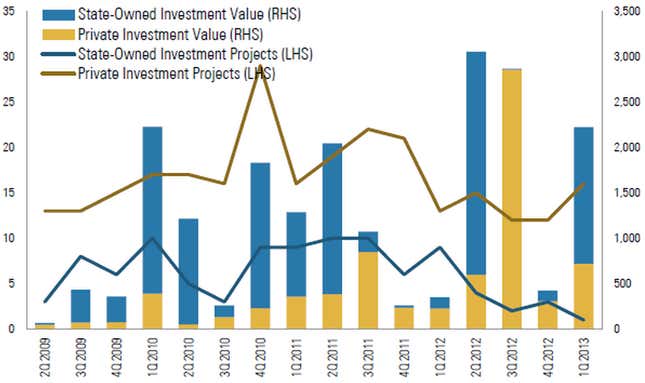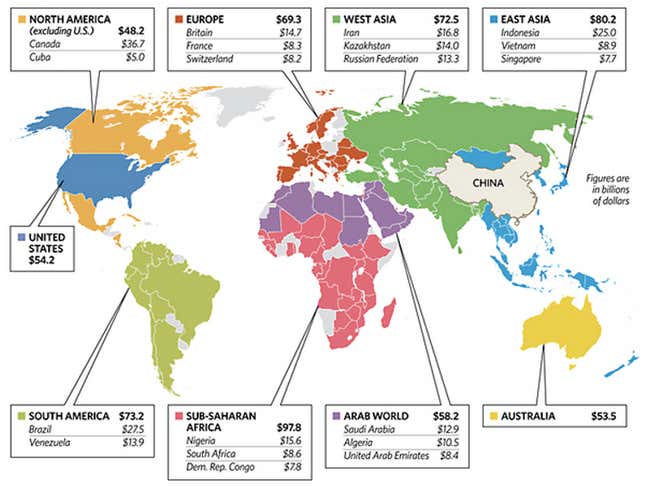For a long time, China’s state-owned corporate behemoths have fueled the country’s growing tide of overseas investment, most of which has gone to East Asia or Africa. Now, more Chinese investment is flowing into the United States, and increasingly from private firms—a shift that could dramatically change how Chinese business deals are done in America and elsewhere.
Even though mainland firms make up only about 2% of total FDI flows into the US, Chinese investment tripled between 2007 and 2012. And over the past 15 months, private Chinese firms have spent as much on US acquisitions and green field investments than in all of the 11 previous years combined, according to a recent note from the advisory firm, Rhodium Group. In that same period, private firms accounted for 80% of all transactions and half of the total value of deals done.

“It’s the beginning of a structural change that will export a lot of capital that has been flowing into China from overseas… a lot of that will come to the US,” Thilo Hanemann, author of the note, tells Quartz.
China is loosening its grip on outbound investment
Before the late 1990s, China discouraged ODI, and even when the government mandated that firms should be “going out” and investing abroad, the policy was directed mostly at SOEs. As recently as 2010, SOEs made up 70% of Chinese ODI (pdf, p.12). In the first three quarters of 2012, that proportion flipped, and private Chinese firms accounted for 62% of overseas deals (pdf, p.12).
Now, there is broad political support for Chinese firms to acquire expertise, talent, and clout overseas in order to move up the value chain, Hanemann says. That’s led to reforms that make “going out” easier for private firms too. Small and medium sized projects now only need to be approved by local officials, who are usually supportive, instead of the central government. And private firms can more easily keep foreign currency earned from exports in offshore accounts, giving them more flexibility in financing overseas deals, according to Hanemann. The government has also launched a few pilot projects for individuals to invest directly overseas, a practice previously banned.

Private Chinese investment might become less touchy
More than $200 billion in potential M&A deals around the world have been thwarted because of regulatory or political opposition to Chinese investment, according to estimates by the US think tank, the Heritage Foundation. Private Chinese firms could ease some of that opposition in the US, where American regulators and politicians worry about ties between SOEs and China’s Communist Party. (The party usually appoints executives at the firms.)
In 2005, the US blocked China’s state owned National Offshore Oil Corporation from buying the American oil giant Unocal over worries the deal had to do with Chinese military aspirations. In contrast, deals between private Chinese firms and US companies have been easier. Dalian Wanda purchased AMC theaters last year for $2.6 billion.
Yet, certain US sectors, like telecommunications, may always be politically sensitive. Private firms like network equipment provider Huawei have come under attack in the US and have since retreated.
China won’t be stealing American jobs. It’ll make them.
Private firms, investing in US real estate, property development, services, and entertainment, may hire more staff than SOEs have. (Chinese SOEs usually focus on capital intensive ventures and spend the bulk of their money on things like machinery.) As we’ve reported before, if Chinese investment in the US continues at the pace it has, SOEs and private firms together could employ 400,000 Americans by 2020.
